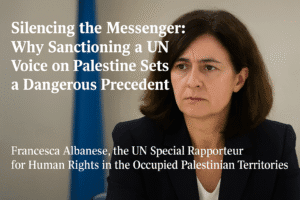Sanctioning UN Voice: 7 Shocking Reasons This Alarming Move Threatens Global Justice
The US sanctioning of UN Special Rapporteur Francesca Albanese for her reporting on Gaza represents a dangerous assault on international institutions. Punishing a UN-mandated official for documenting human rights abuses and engaging with the ICC sets a perilous precedent, enabling powerful states to silence critics investigating allies like Israel. This move, suspiciously timed after Netanyahu’s visit and Trump’s Nobel nomination, undermines multilateralism by attacking the UN’s independence.
Amid Gaza’s humanitarian catastrophe, the focus on silencing Albanese is absurdly misplaced. Legally baseless accusations of antisemitism cannot disguise the retaliation against her calls for corporate accountability regarding Gaza funding. The sanctions defy growing global condemnation, including from BRICS nations and India, prioritizing political allegiance over justice and the rule of law. Ultimately, this intimidation tactic shields potential atrocities from scrutiny and deepens impunity.

Sanctioning UN Voice: 7 Shocking Reasons This Alarming Move Threatens Global Justice
The US decision to impose sanctions on Francesca Albanese, the UN Special Rapporteur for human rights in the occupied Palestinian territories, is more than just another geopolitical spat. It’s a direct assault on the principles of multilateralism and the crucial, often uncomfortable, work of human rights defenders. Targeting a UN official for performing her mandated duties sends shockwaves through the international system and risks silencing vital scrutiny precisely when it’s needed most.
The Heart of the Matter: Punishing Criticism
Albanese’s “crime”? Her rigorous reporting on the devastating human cost of the conflict in Gaza. Her June report, urging accountability for corporations potentially funding the conflict, clearly struck a nerve. The US sanctions, announced by Secretary of State Marco Rubio, appear to be retaliation for this criticism and her engagement with the International Criminal Court (ICC), an institution already under US sanctions. The timing, following Israeli Prime Minister Benjamin Netanyahu’s visit to Washington and his announcement nominating former President Trump for a Nobel Peace Prize, raises significant questions about political motivations overriding legal principle.
Why This Move is Fundamentally Flawed:
- Undermining the UN Mandate: Albanese isn’t a rogue actor; she serves at the request of the UN Human Rights Council. Sanctioning her for fulfilling her mandate directly attacks the independence of UN mechanisms. It signals that powerful states can punish officials whose findings they dislike, crippling the UN’s ability to impartially document abuses.
- A Dangerous Precedent: If a UN Special Rapporteur can be sanctioned for reporting on alleged war crimes or genocide (terms Albanese has used regarding Gaza), what stops other nations from targeting rapporteurs investigating their own human rights records? This sets a perilous template for silencing inconvenient truths globally.
- Misplaced Focus & Absurdity: Amidst the catastrophic humanitarian crisis in Gaza, unresolved hostage situations, and stalled ceasefire efforts, the US government’s focus on sanctioning a single UN official feels grotesquely out of touch. It prioritizes silencing criticism over addressing the root causes of immense suffering.
- Legally Unfounded Accusations: Rubio’s justifications crumble under scrutiny. His claim that Albanese needed US and Israeli “consent” to engage with the ICC is legally baseless – the court operates independently. Accusations of “unabashed antisemitism” and “support for terrorism” appear to be unsubstantiated smears, weaponized to deflect from the substantive critiques in her reports.
- Ignoring Global Consensus: The US actions fly in the face of growing international concern, including the recent condemnation by the BRICS summit – significantly joined by India. This isolation highlights how the move prioritizes a specific political alliance over widely shared principles of accountability and human rights.
The Real Cost: Silencing and Impunity
The immediate effect is an attempt to muzzle a specific voice. The deeper cost is the chilling effect on all international human rights work and the erosion of trust in multilateral institutions. When the world’s most powerful nation punishes a UN official for documenting potential atrocities, it implicitly signals that impunity for allies is acceptable. It shifts the focus away from investigating alleged violations and towards intimidating those who dare to report them.
What Should Happen Instead?
The path forward isn’t sanctions against investigators; it’s accountability for actions. The urgent need remains:
- An immediate, sustained ceasefire.
- Unimpeded humanitarian access to alleviate the suffering in Gaza.
- Genuine efforts towards the release of hostages.
- Independent, impartial investigations into all alleged violations of international law by all parties.
- Support, not sabotage, for the UN bodies mandated to uphold human rights globally.
Sanctioning Francesca Albanese doesn’t resolve the crisis in Gaza; it exacerbates it by attacking the very mechanisms designed to uphold justice and human dignity. It’s a counterproductive, dangerous, and ultimately self-defeating move that prioritizes political expediency over principle and the rule of law. The world needs more voices speaking truth to power, not fewer. Silencing them only deepens the darkness.
You must be logged in to post a comment.